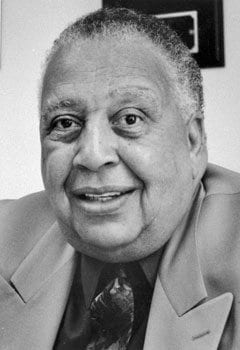
Paul Parks liked to tell the story of a conversation he had with the dean of engineering at Purdue University. Parks was a freshman at the time and had dreams of becoming a civil engineer. The dean had another idea. He wanted Parks to become a farmer.
That was in 1941 and the Indiana campus, much like the rest of the nation at the time, was segregated along racial lines — and thinking. As one of eight African Americans in an engineering school of 8,000 whites, Parks didn’t want to hear it.
After fighting in World War II, Parks went on to graduate from Purdue in 1949 with a bachelor’s degree in civil engineering. His career didn’t stop there. In 1951, he became the first African American to work for the Stone and Webster Engineering Corp. in Boston.
Over the next 40 years, Parks’ engineering work included the research and design of aircraft engines, missiles, highways, housing developments, hospitals and hydroelectric stations.
Parks was a remarkable man, and though he was an engineer by training, he was first and foremost an educator by calling, and a civil rights activist by nature.
He served as co-chairman of the education committee of the Boston branch of the National Association for the Advancement of Colored People during the turbulent 1960s, and helped draft the state’s Racial Imbalance Act. He was one of the founders of the Metropolitan Educational Council for Educational Opportunity Inc., better known as METCO, and went on to become president of the Boston School Committee and later the state’s secretary of education under Gov. Michael Dukakis.
Parks always attributed his success to his mother. Born on May 7, 1923, Parks grew up in Indianapolis. His mother urged him to excel in school in order to avoid ending up being a ditch digger.
“She wanted me to be somebody,” Parks said.
Last week, Parks lost his fight against cancer and died in his Mattapan home. He was 86 years old. To the end, he was fighting to improve the education of minority students. Parks was particularly concerned with the use of standardized testing as a requirement for high school graduation.
“Since it is almost impossible for a person to receive a decent job without a high school diploma, we increase the obstacles for these people to have a reasonable life quality in our society,” Parks wrote. “We cannot place total responsibility for the students’ learning achievement on the students. I believe that if a school has low performance on any testing program, the first people that we should look to and hold responsible are the principal and teachers. It is their responsibility to find ways of training the children in their charge.”
Parks was more than a critic. He offered a solution to help close the racial gap in test scores — public boarding schools.
“Even if it were to cost as much as three times what we are presently spending to educate a pupil in our public schools,” Parks argued, “the public boarding school would be worth it if it can be shown that these schools are able to produce a high school diploma for 90 percent of the enrolled students. … These schools would follow the models of private boarding schools. … They would be voluntary, arranged upon the request of the parents and the agreement of public school personnel. And they would be free, part of our public school system.”
Parks was a leader in words and deeds. He prided himself on the discipline that he learned in the U.S. Army. Shortly after the bombing of Pearl Harbor, Parks enlisted in the then-segregated military. He told the story of traveling through Kentucky en route to basic training, during which he noticed several armed white men lining the platform awaiting the colored recruits.
The problems continued in England, where white soldiers harassed, and in some cases shot, black soldiers. Parks attained the rank of first sergeant assigned to the 365th Engineering Regiment and received an honorable discharge in 1943.
Parks leaves his wife of nearly 38 years, Virginia (Loftman) of Mattapan; a son, Paul Jr. of Cumberland, R.I.; a daughter, Pamela Parks McLaurin of Milton; Stacey Parks Townsend of Canton, a daughter from his wife’s previous marriage whom he adopted; a sister, Dorothy Jean Parks of Quincy; and four grandchildren.






